I have a range of books for you today, from mystery and romance to history, fantasy/horror, and a classic that I adored. Let’s get right to the reviews!
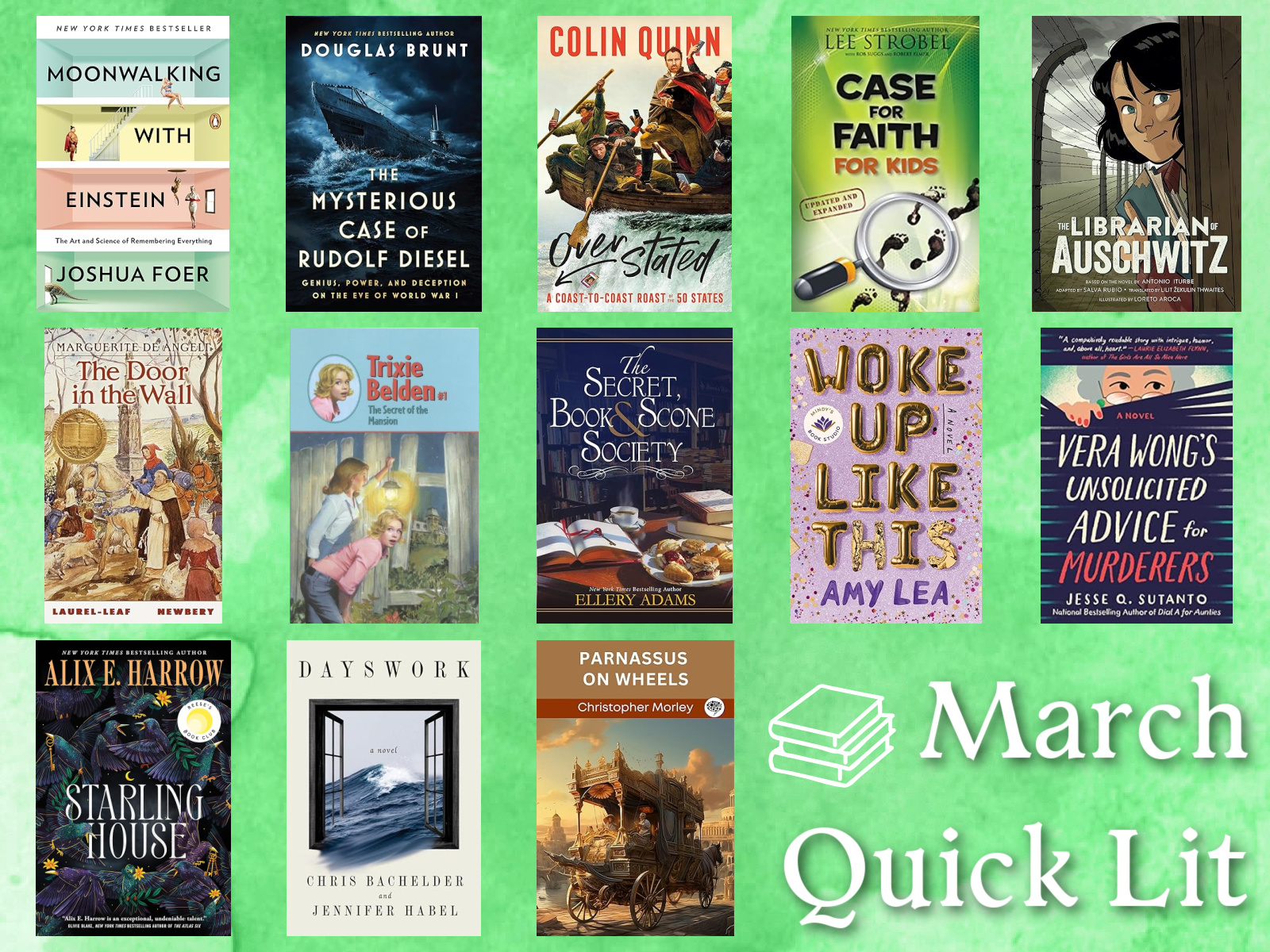
MIDDLE GRADE
Trixie Belden #1: The Secret of the Mansion, by Julie Campbell: With her older brothers working as camp counselors all summer, 13-year-old Trixie is certain that her own summer at home on their farm in Sleepyside, New York, is doomed to boredom. But when a wealthy family (with a daughter named Honey who is just Trixie’s age) moves in next door, the adventures begin. Trixie helps Honey break away from her sheltered upbringing, teaching her to ride a bike and going on grand adventures, while Honey introduces Trixie to a life of horseback riding, luxurious meals, and fancy clothes.
When the girls’ elderly neighbor is hospitalized with pneumonia, Trixie and Honey begin to explore the miser’s rundown old mansion and come across Jim, the neighbor’s 15-year-old great-nephew, who is running away from his abusive stepfather. The trio must keep Jim’s presence a secret but are determined to find the house’s hidden fortune that could be Jim’s gateway to freedom. One thing is certain: this will be one summer that Trixie Belden will never forget.
I’m not sure how this darling series (begun in 1948) escaped my attention for so long and I’m glad I came across it on a list of my library’s recommended books, because this book is an absolute gem! Trixie is a spunky and endearing heroine, a slightly younger and spicier version of her (equally loved) counterpart, Nancy Drew. The characters are well-drawn and the plot is fast-paced and well developed, if a little convoluted (but could we expect any different from a children’s mystery series?). I loved the quaint setting and wholesome family values, a refreshing contrast from the obnoxious personalities and warped values featured in many present-day stories. There are also wonderful themes of survival, resourcefulness, getting to know someone before passing judgment, and appreciating the lives that we have.
This is very much a book of time, which is mostly delightful: how wonderful to see adventurous, responsible, and independent children engaging in sleuthing, household chores, and play! I enjoyed the clothing and food descriptions and the way of life that is so different from my own. However, because this was written in the 1940s, there are some elements that modern readers may find off-putting, such as casual descriptions of child abuse and neglect; an emphasis on body size; and some unkind judgments/descriptions of a few of the characters. (These did not bother me as an adult reader, but some parents may want to be aware of this before passing this book to their children. ) Personally, I LOVED this story and would like to continue the series (especially since this book ended on a cliffhanger!), hopefully with my kids.
My Rating; 4.5 Stars (Rounded to 5 Stars on Goodreads) // Book Format: Print
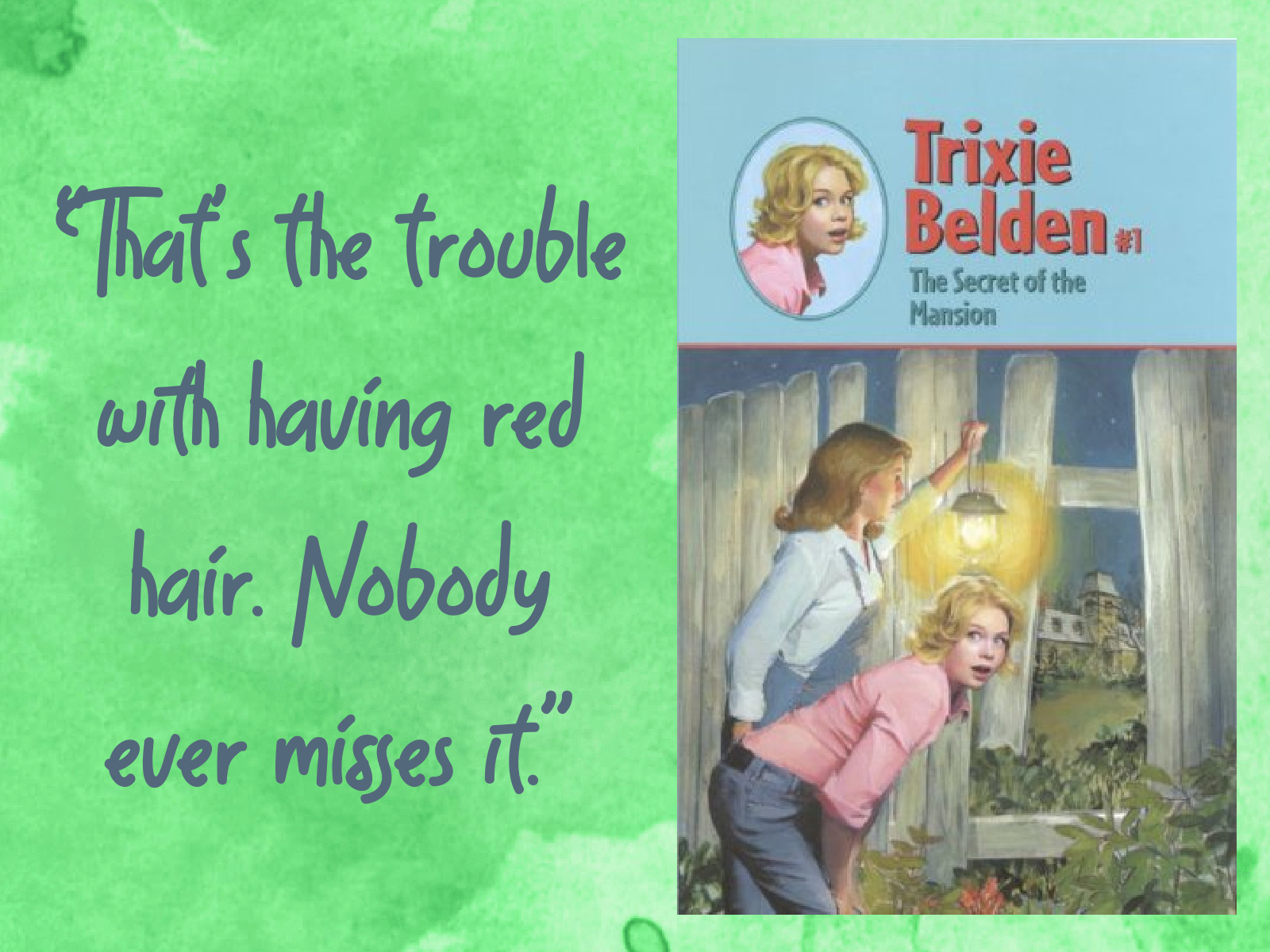
The Door in the Wall, by Marguerite de Angeli: Set in the Middle Ages as the Black Death is sweeping across the country, this is the story of young Robin, the son of a nobleman who has always known he will grow up to be a knight. But then an illness causes him to lose the use of his legs, and with his parents away serving the king and queen during the war, his plans for knighthood training are instantly dashed. Robin is saved from what would certainly be a lonely death in his own abandoned home by Brother Luke, a monk who carries him to the monastery of St. Mark’s where Robin learns to read, whittle, swim, and walk with the use of crutches.
Through his time at the monastery Robin gains physical, emotional and spiritual strength as he discovers that even life’s greatest setbacks are not final, and that hope can always be found by searching for the door in the wall.
This Newberry winner, published in 1949, has a great sense of place and lovely themes of perseverance and bravery, but despite its short length (just over 100 pages) it was a challenging read-aloud for us. There are a number of uniquely-named characters to keep track of, and the formal writing style makes the story difficult to follow. The dialogue mimics language of the Middle Ages, and there are many unfamiliar terms and phrases that were stumbling blocks in our reading. (We generally appreciate the chance to encounter new words and ideas in our family books, but there were just too many here to get our heads around.)
I think we might have enjoyed this if the kids were older, or as part of a unit on the Middle Ages, but as a stand-alone read-aloud, I don’t know that it was a great fit. HOWEVER, Charleston really resonated with the themes (specifically, the notion we should not be limited by our physical differences, and that everyone has a unique God-given purpose), so even if I didn’t love the reading experience, I’m glad that we read and discussed it.
My Rating: 3.5 Stars (Rounded to 4 Stars on Goodreads) // Charleston’s Rating: 4 Stars // Book Format: Print
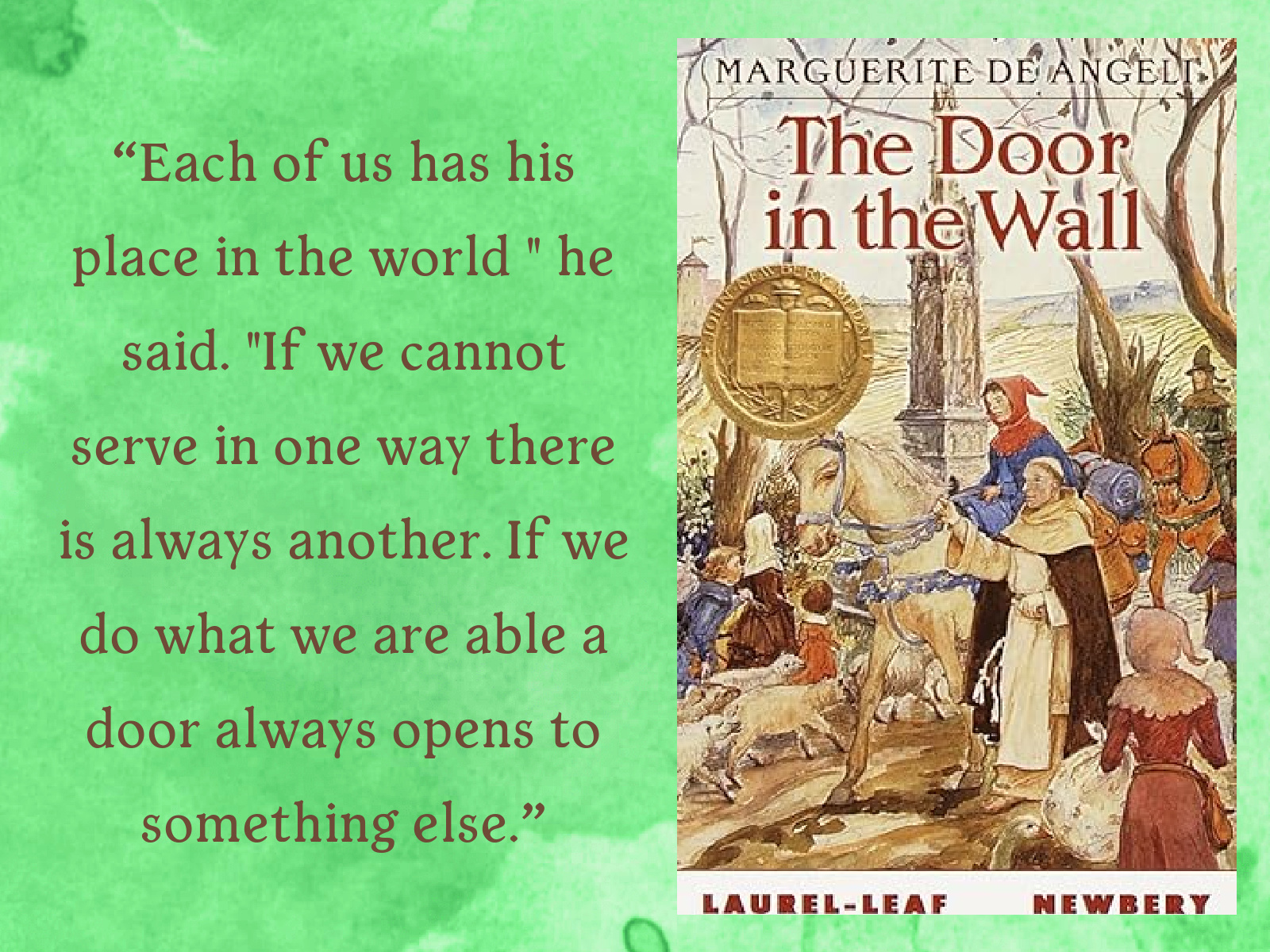
The Librarian of Auschwitz: The Graphic Novel, by Antonio Iturbe: The Librarian of Auschwitz is a graphic novel based on the true story of Dita Kraus, a fourteen-year-old girl from Prague, who is taken by Nazi soldiers in the fall of 1942 and imprisoned at Auschwitz. For most, this would have been a death sentence, but Dita and her parents are placed in Camp BIIb, a camp set up for propaganda purposes where prisoners still faced horrific circumstances but also received some privileges, such as getting to keep their own clothing and hair and—most importantly—not immediately being sent to the gas chambers.
When Freddy Hirsch, a Jewish leader within the camp, charges book-loving Dita with protecting eight precious volumes and using them to teach her fellow prisoners, Dita bravely assumes the title of camp librarian. Dita and her books give hope and purpose to the prisoners even as they struggle to survive. But Dita knows that nobody can be trusted in Auschwitz, even those she assumes are friends. Each day is an exercise in discernment and relentless courage as Dita holds on to all that is most precious while also hoping to experience life after Auschwitz.
I did not know the stories of Dita Kraus or Freddy Hirsch and love that this dramatic graphic novel was based on a true story with such admirable heroes at its center. I also enjoyed the bookish focus and strong themes of strength, resilience, and hope. Some of the plot was difficult to follow and I felt the book needed to be longer to tell the complete story, but historical notes included in the back of the novel helped to fill in some gaps.
I chose to read the graphic novel adaptation rather than the original story because the premise intrigued me, but I’ve been in an emotionally tender place and did not feel ready to engage the full book; my hope was that this graphic novel would be a little lighter, and while the format does add some levity to a challenging story, the creators (rightly) do not shy away from the atrocities of the Holocaust. I believe this book succeeds in framing an important but difficult story in a way that will be more accessible to the intended Middle Grade/YA audience (and to sensitive adult readers like myself).
That said, there are quite a few illustrations of the naked Jewish prisoners that felt somewhat gratuitous and unnecessarily graphic. I also was not expecting the introduction of homosexual themes. These issues, combined with the general subject matter, would keep me from putting this in the hands of any readers younger than 8th or 9th grade. As an adult reader, I’m glad to have read this powerful little book with a story and a message I will not soon forget.
My Rating: 4 Stars // Book Format: Print
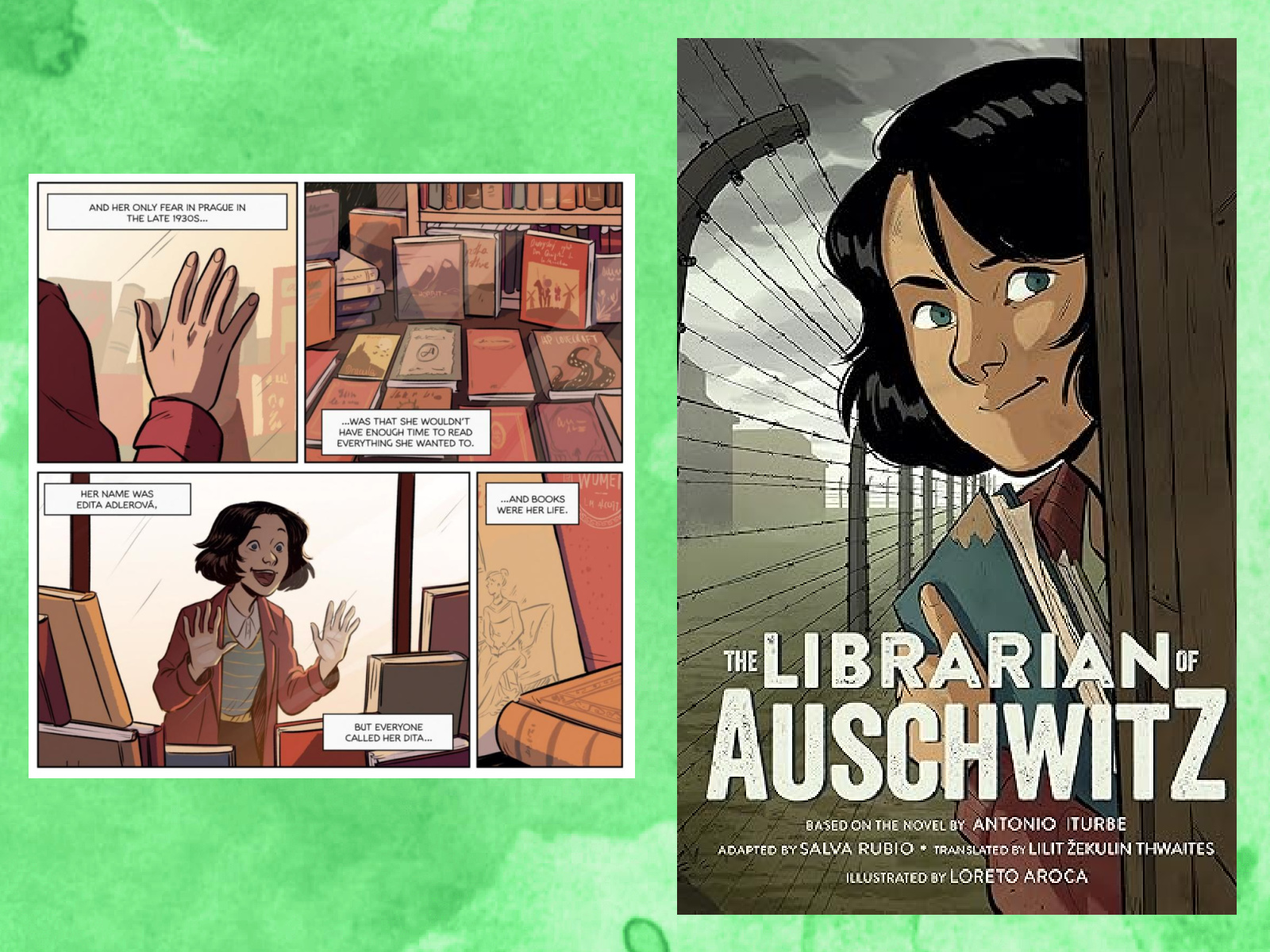
Case for Faith for Kids, by Lee Strobel: Charleston has been asking some pretty big faith questions lately. We’ve spent quite a bit of time on apologetics in the past, including in our Foundation World View curriculum, and I’ve answered a lot of his questions based on my own Biblical study. But I thought an extra resource could be beneficial, which led us to this kid-friendly version of a popular apologetics title for adults.
The book is mostly written to an audience of kids who have previous familiarity with God and Scripture, and it seeks to answer some of the questions kids ask most, such as why God would allow bad things to happen, whether or not Jesus is the ONLY way to God, and if it’s okay to call yourself a Christian but still experience doubts. The book includes historical evidence and scientific proof, as well as the ideas from prominent philosophers and theologians. In the book’s final chapters, we are given short stories about kids/teenagers facing some of these questions in real-life situations, prompting readers to contemplate how THEY would respond.
I am a huge believer that kids are exceedingly capable of grasping challenging ideas, and I’ve loved digging into theology and apologetics with Charleston (and even the twins, who are only four). I liked the questions asked in this book, and the responses were totally on point. However, I didn’t love the format that is a little chaotic and seemed to be trying TOO hard to be relevant and kid-friendly. There is lots of random (secular) trivia and silly dialogue-style sections that distracted from the main messages, leaving both Charleston and me confused rather than engaged with the content. The book easily could have been twice as long based on content alone, yet the extras that were supposed to make it “fun” made it feel TOO long (not great for a book that comes in under 150 pages).
I’m glad that we read this and do feel it helped to quell some of Charleston’s concerns. It prompted good discussion and has us eager to dig deeper into these topics through other more robust resources. If you’re looking for books on faith to hand to your kids, this one could be helpful and certainly won’t cause any faith-based harm, but I’m determined to find some better resources (books written for kids AND parents, not books intended solely for parents, as I have plenty of those), and will be sharing them when I do!
My Rating: 3.5 Stars (Rounded to 3 Stars on Goodreads) // Book Format: Print
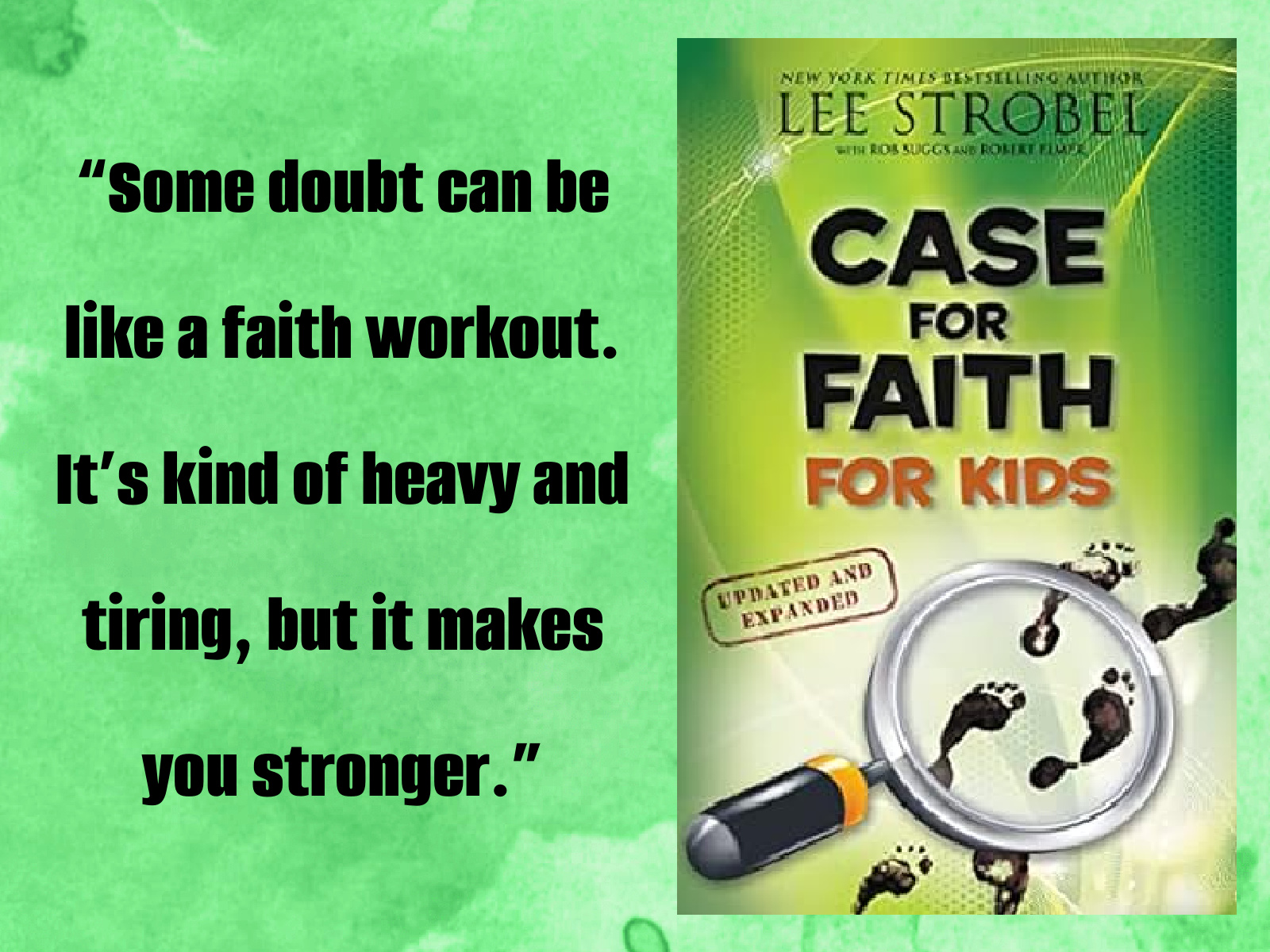
NONFICTION
The Mysterious Case of Rudolf Diesel: Genius, Power, and Deception on the Eve of World War I, by Douglas Brunt: In September of 1913, Rudolf Diesel—German inventor of the Diesel engine, and one of the most famous men in the world at the time—disappeared over the side of the steamship Dresden bound from Belgium to England. At the time his death was largely viewed as a suicide, and soon Diesel’s life and legacy were forgotten amidst the chaos of World War I. But the circumstances around Diesel’s disappearance were not nearly as straightforward as contemporary papers made them seam, and may very well have been an accident, murder, or something else altogether.
In this well-crafted biography (that at times reads like a novel), Douglas Brunt tells the fascinating life story of Rudolf Diesel, from his impoverished German and French origins to his rise to wealth and fame thanks to the invention of a powerful engine that did not require petroleum-based fuel. Despite his success, Diesel gained the enmity of many including John D. Rockefeller (the founder of Standard Oil, whose business could be jeopardized by this new type of engine) and Kaiser Wilhelm II of Germany (who coveted the use of Diesel’s engines to fuel his fleet of submarines that would challenge the British Navy—but Diesel had hoped for his engine to be used for the betterment of civilization, not for war). Brunt traces the lives and motives of these three men, leading up to Diesel’s disappearance. He then makes a convincing argument for what HE believes happened to Rudolf Diesel on that fateful night.
Before learning about this book, my only familiarity with the name “Diesel” came from signs at the gas pump (it’s the type of gas I don’t use!). This book introduced me to a fascinating individual with an inspiring story and commendable worldview. Brunt does an excellent job of letting us know this man who was brilliant and insightful, forward-thinking and possessing high moral standards. Some parts of the narrative were a little dry (mostly the engineering descriptions that filled the book’s middle sections), but the human elements kept me reading and the mystery at the end had me utterly riveted. By the end, Brunt had me convinced of his theories and wondering how this incredible story never received greater attention.
My Rating: 4 Stars // Book Format: Audiobook (This was great in the format; I really enjoyed the narrator.)
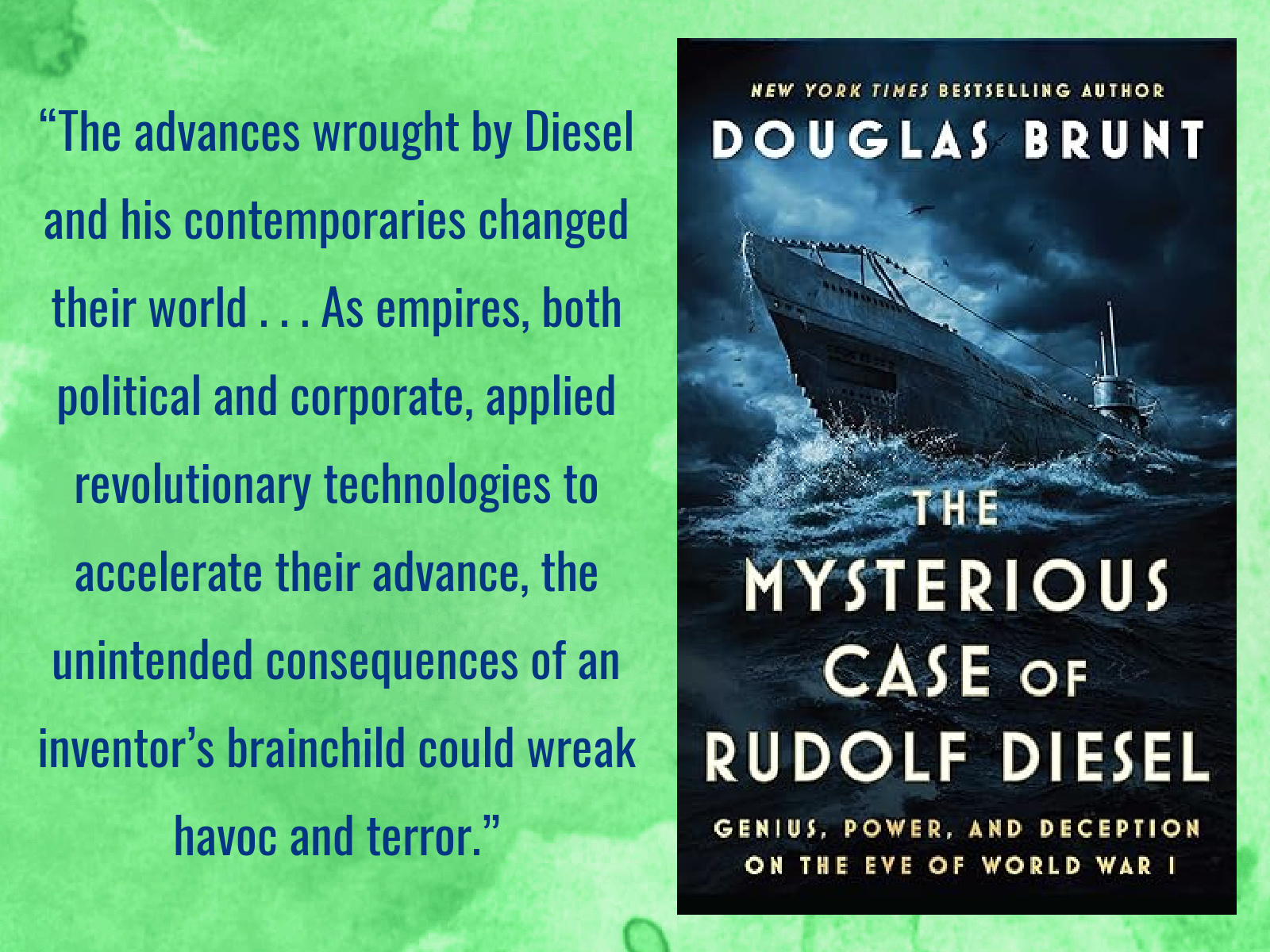
Habits of the Household: Practicing the Story of God in Everyday Family Rhythms, by Justin Whitmel Earley: I loved this family-centered book on spiritual formation SO MUCH that I dedicated an entire post to it (which I’ll be sharing next week). Stay tuned!
My Rating: 5+ Stars! // Book Format: Kindle
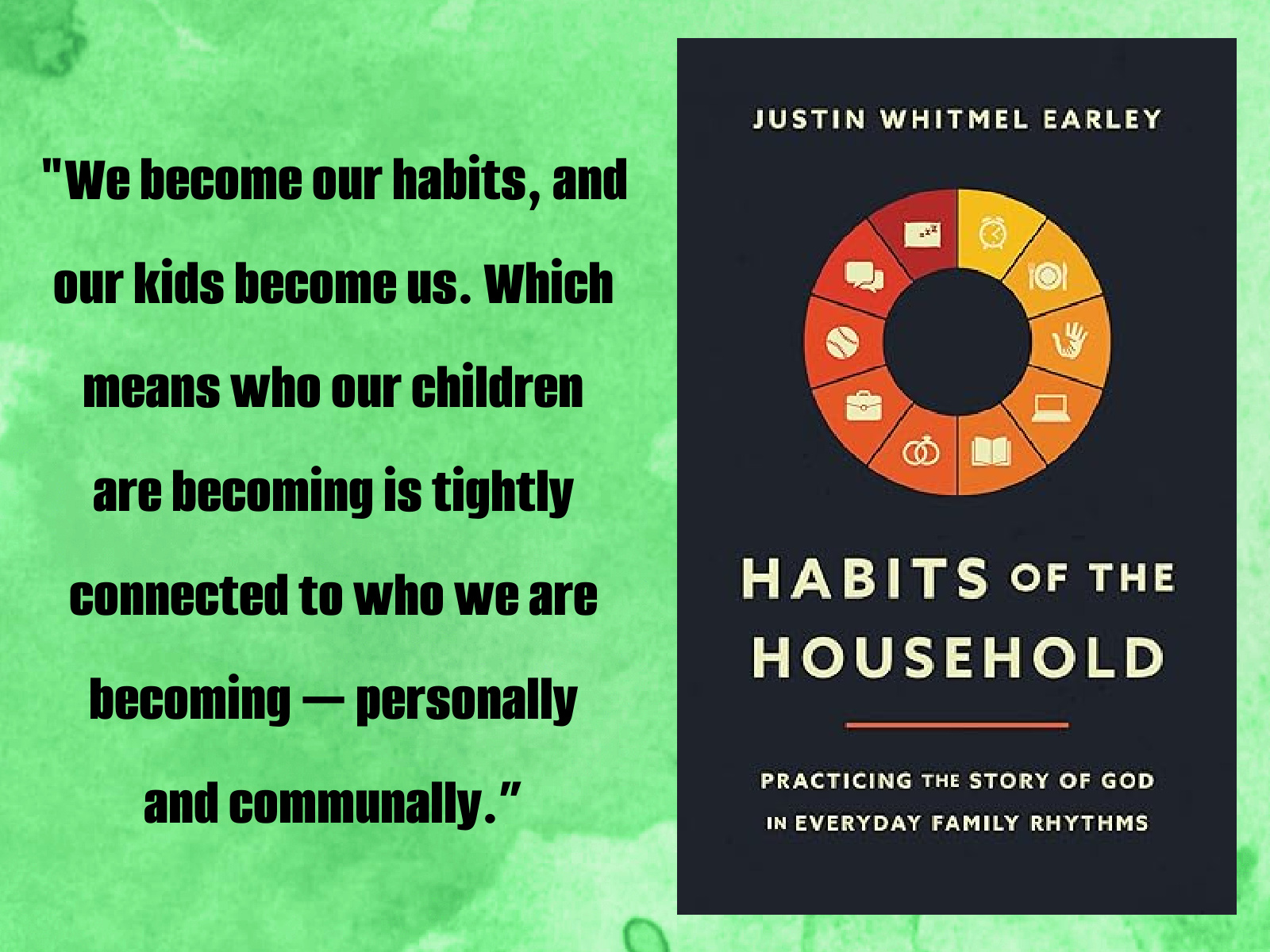
Moonwalking with Einstein: The Art and Science of Remembering Everything, by Joshua Foer: I’ve long thought that if I could have any superpower, I would choose the power of memory. How amazing to have an ability to remember every fact and event I’d ever encountered?! That superpower is obviously not in my future, but there ARE ways to improve my memory skills, as journalist Joshua Foer proved in his yearlong quest to improve his memory under the tutelage of top mental athletes. At one time, Foer possessed moderate memory skills, but after attending a USA Memory Championship, Foer became fascinated by the science of memorization and endeavored to participate in—and hopefully even win—the championship the following year.
This book follows Foer on his one-year journey of preparing for the championship. Foer introduces us the memory techniques he learned (most notably, the tool of the Memory Palace in which an individual visualizes a familiar place and populates a route through that space with elaborate images). This is more than just a book on strategies, though. Foer also examines the rise and fall of human memory skills (due mostly to the rise of books and the internet that make internal memorization less crucial for daily living); the science of memory; and a cultural history of memory (especially how changes in memory skills have led to broader changes in the way that contemporary people think). He explores the importance of memory in our perception of time; looks into specifics of how the brain creates, stores, and accesses memories; and ponders the phenomenon of memorization as a competitive sport. We are introduced to many memory experts and “savants” (though Foer goes a long way in dispelling the notion of savanthood), brain scientists, teachers who still prioritize rote memorization (taboo in today’s academic circles that emphasize experience over memory!), and some of the best (and worst) memories in the wold).
I’ve long been fasciated by brain science and was captivated by the themes of this book. It is well-researched and the prose is engaging, with Foer’s own memory challenges lending a sense of suspense to the narration. Despite its many selling points, the book felt a little too long with too many detours into individuals whose stories didn’t add to the book in any way. Overall, this was an engaging and informative read that had me marveling at the wonders of the human mind.
My Rating: 4 Stars // Book Format: Audiobook (Followed along on Kindle)
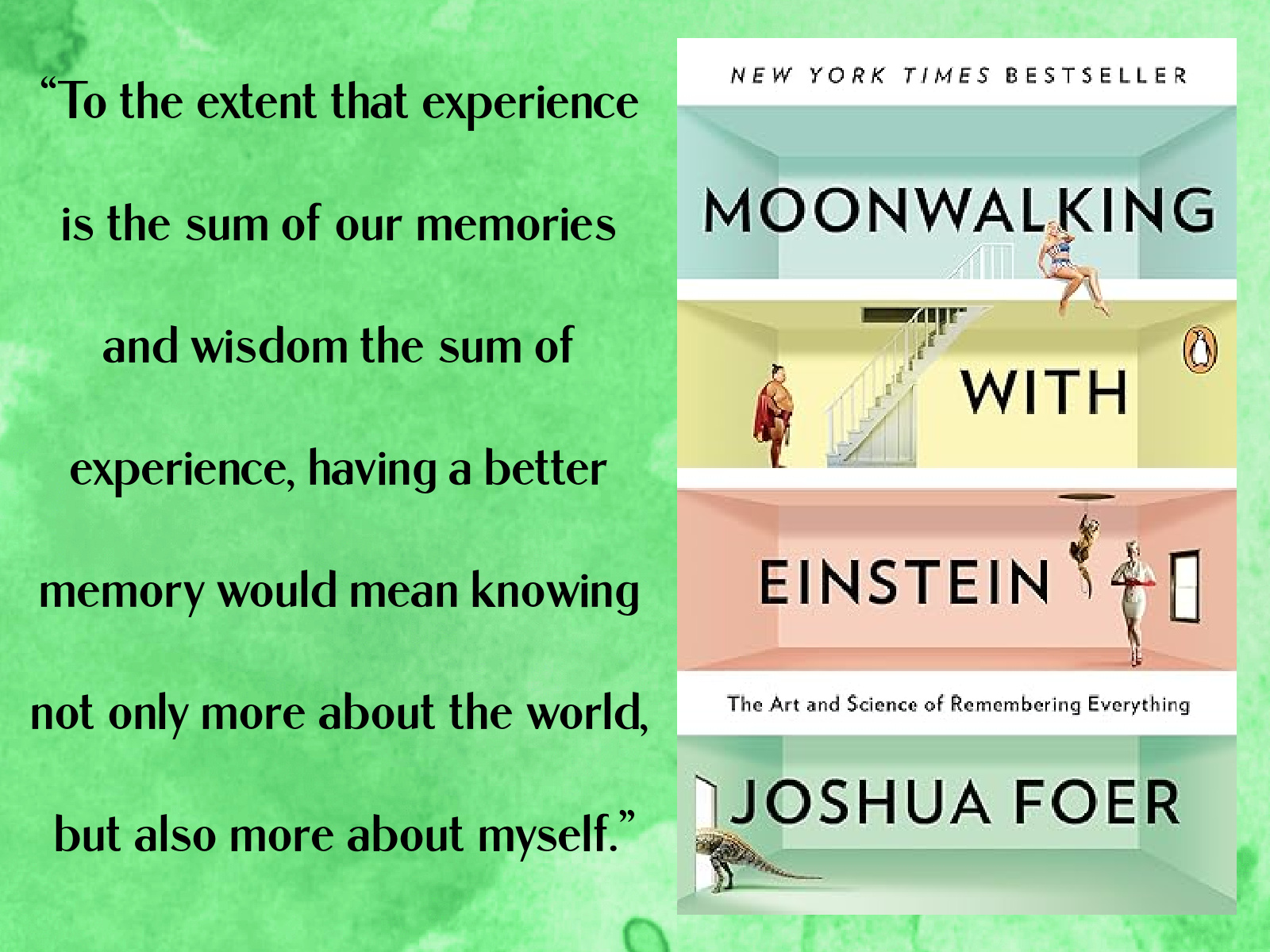
Overstated: A Coast-to-Coast Roast of the 50 States, by Colin Quinn: “Every time I go to different states it’s like going to a family wedding or reunion where all the distant cousins are gathered. You get that feeling that these people are nothing like you. You can’t believe you are related to them. But then you see them make a gesture or facial expression and you go, ‘Oh yeah, I see how we have the same blood.” So begins comedian and social commentator Colin Quinn in this state-by-state roast. From Connecticut to Hawaii, Quinn identifies the quirks of each state and its citizens, examines a touch of each state’s history and how it led the state to where it is today, and identifies the hypocrisies between our nation’s (and our states’) stated values and our lived experiences. Throughout the book he asks the question of who we are—individually and collectively—and whether or not we can stand together, despite our vast differences.
Above all, this book is intended to bring about chuckles. Quinn digs in deep to state stereotypes—some that ring true but most of which are vastly overstated—going out of his way to offend just about everyone. While I did laugh a bit, I thought this could have been much funnier (and much less crass), though I have to give Quinn kudos for his heterodox ideas and willingness to speak them into book form (rare in today’s hypersensitive cancel culture). I disagreed with most of Quinn’s political ideology (I tend to be a strict Constitutionalist, and Quinn appears to be the opposite) but I did learn some, and the state-by-state format left me wanting to know more about the unique ideals and cultures of each of America’s great states. I also came away from this unconventionally patriotic little book feeling proud to be an American—our country is far from perfect, but there is certainly a lot to love and celebrate.
My Rating: 3.5 Stars (Rounded to 3 Stars on Goodreads) // Book Format: Audiobook
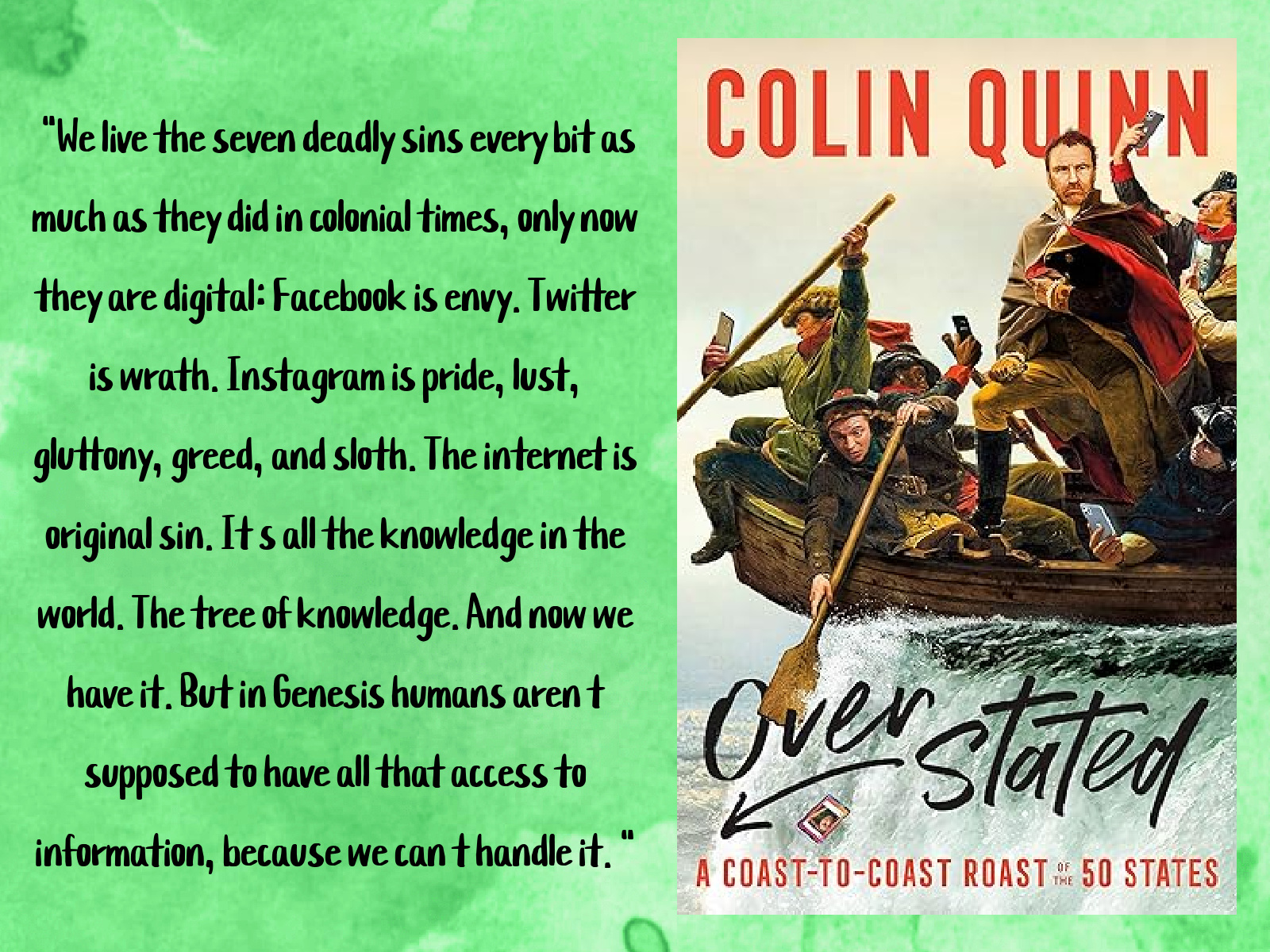
FICTION
The Secret, Book & Scone Society, by Ellery Adams: Miracle Springs is a safe haven for wounded individuals who flock to the North Carolina town for healing in the form of hot springs, specially-baked “comfort scones” from Gingerbread House Bakery, and curated book hauls from Miracle Books. But not all of the town’s residents have found the same healing pursued by tourists. Nora Pennington, the local bookseller, came to town four years ago to escape tragedies of her past, yet her face and her heart remain indelibly scarred by mistakes of her past life.
When a visiting businessman is found dead on the local train tracks, Nora has an opportunity to reach beyond her pain to clear the man’s name. She is joined by June, Hester, and Estelle—three other Miracle Springs woman with fractured pasts and damaged souls. The women form the Secret, Book, and Scone Society with the aim of uncovering the truth behind the businessman’s demise; but before they can unite in this deadly investigation, the women agree to share their darkest secrets with one another in an effort to trust each other and find redemption in their stories.
It’s been a while since I indulged in a cozy mystery and I really enjoyed this one! The mystery itself was subpar and a little cheesy, but I loved our four protagonists and their unique journeys to healing and hope. The town of Miracle Springs gave me all the cozy vibes; I only wish I could book a plane to this town to pick up my own freshly baked comfort zone, visit Nora in her tiny train car home, and receive nourishing book recommendations! The bookish themes (with tons of quotes, title references, and even some literary commentary) definitely elevated this from mediocre to memorable reading experience.
My Rating: 4 Stars // Book Format: Kindle
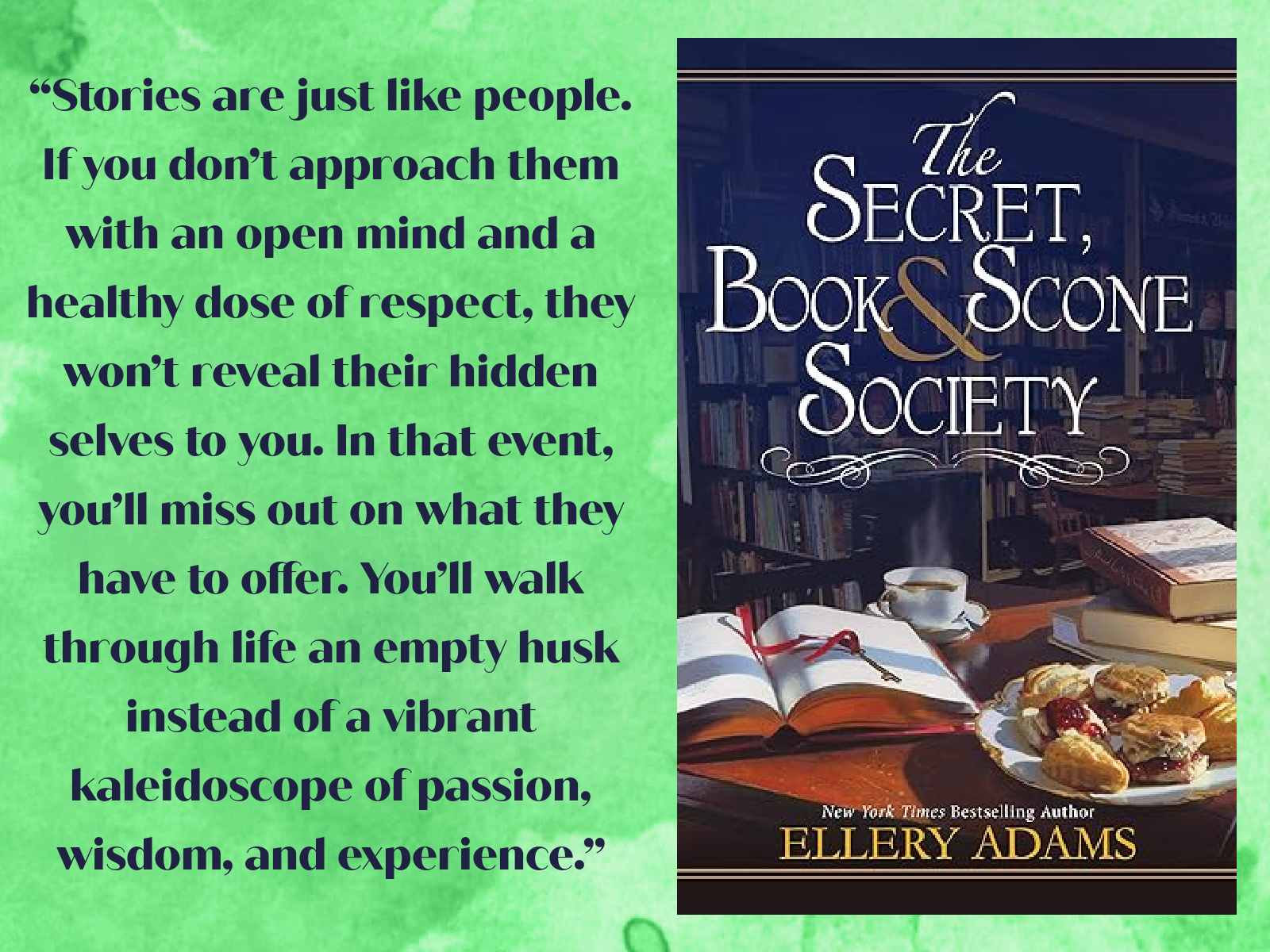
Dayswork, by Chris Bachelder and Jennifer Habel: As the COVID-19 pandemic stretches on, a woman devotes her endless days to researching Herman Melville: his work and devotion to his art; his unhappy marriage and financial woes; and his intense friendship (romance?) with his contemporary Nathaniel Hawthorne. The narrator’s research soon extends to the equally complex lives of his biographers and other Melville enthusiasts, leading her to take a closer look at her own marriage, ambition, and obsessions.
I don’t know that I’ve ever read anything quite like this, and am not sure how to categorize it: part biography, part literary analysis, part reflective fiction (this is technically a novel, though I would easily have assumed this was a memoir of a real woman’s pandemic project). I picked this up on the recommendation of Anne Bogel; if not for her high praise I NEVER would have chosen to read a book about the author of Moby Dick, one of the worst books I’ve ever read (at least it was when I read it for my high school English class; I don’t have it in me to give the book another chance to see if my opinion may have changed). I found the facts of Melville’s life interesting, though depressing, and appreciated the subtle commentary on how our lives are shaped by the the lives of those around us (including some we may never truly meet).
My favorite parts of the book were the interactions between our narrator and her husband, and I wanted more from these interludes between the Melville research. It reminded me of the conversations of art and work that I have with my own husband, and how our interests can connect us even when they are not mutual. I’m surprised by this book’s high ratings as I didn’t find it to be anything special, but I’ll admit that it was refreshing to read something so different.
My Rating: 3.5 Stars (Rounded to 3 Stars on Goodreads) // Book Format: Audiobook
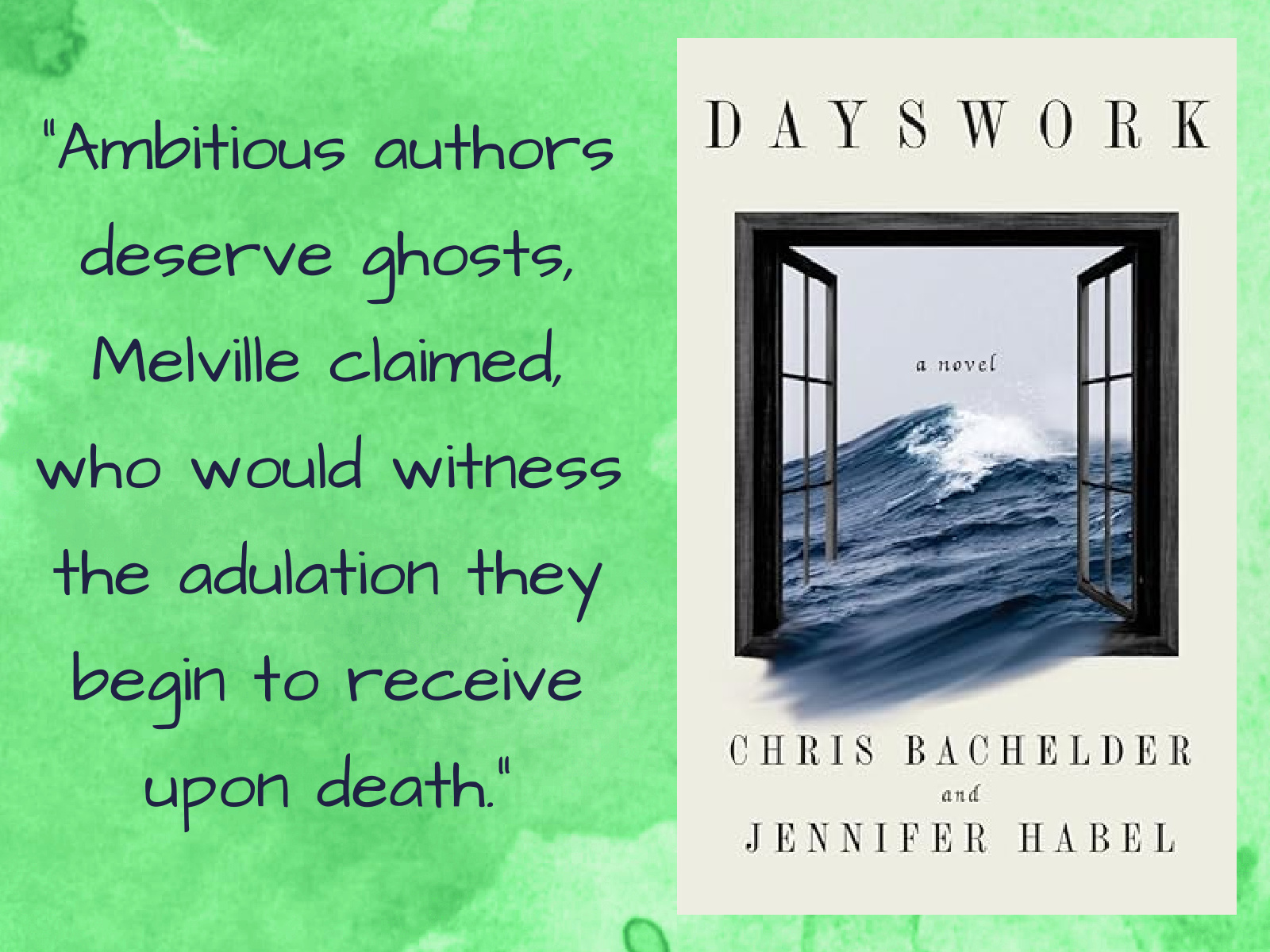
Starling House, by Alix E. Harrow: Opal has not had an easy life: she’s an orphan, a high-school dropout, perpetually homeless (the motel room where she resides could hardly be called a home), and the sole caretaker and provider for her teenage brother, Jasper, for whom she is determined to find a better life. Opal and Jasper have always resided in the murky and eerily luckless town of Eden, Kentucky, infamous for its sinister coal mines, bloodthirsty businessmen, and E. Starling, a reclusive nineteenth century novelist whose morose children’s novel became a cult classic. In addition to her novel (a book with which Opal has long been obsessed), Starling left behind her home, Starling House—a ramshackle mansion long thought to be haunted, and shrouded in town lore.
Since her youth, Opal has dreamed of Starling House despite never having seen it. When she gets the unexpected opportunity to step inside the forbidden mansion, Opal realizes that Starling House and its legacy may be more closely tied to her own history than she could have thought possible. Sinister forces keep drawing Opal back to this house and its misanthropic warden, Arthur, whose nightmares mirror Opal’s own and who also has spent a lifetime held to this house and this town that he just can’t escape.
After reading and loving Harrow’s The Ten Thousand Doors of January, I couldn’t wait to get my hands on this novel that promised to offer some of my very favorite tropes: gothic vibes, an atmospheric fairy tale setting, and a house that is a prominent character in the story. And I loved the first half of this book as we got to know scrappy Opal (whom I didn’t exactly like, but who certainly had me intrigued), curmudgeonly Arthur, the enigmatic house, and the foreboding town of Eden, Kentucky.
As the story progressed I grew less engaged: this is much darker than I’d anticipated, reading more like horror than fantasy, and I didn’t care for the absurd and supernatural aspects that are introduced in the back half of the novel. The action picks up in the book’s later chapters, and I’m a rare reader who doesn’t care for a lot of descriptive action in my novels, so these plot turns simply didn’t hold my attention. I wanted more of the town, the history, the character development, the clever footnotes, and the intriguing commentary on story, imagination, destiny, found family, and sacrificial love. (All themes that are present and could have been explored further.)
Harrow is a phenomenal storyteller and her prose is exquisite, but some of the storylines were difficult for me to follow, and the motivations of most of the characters made little sense to me. I struggled with the YA nature of this book that I think was meant for adults; I especially had a hard time with the character of Opal, who is in her late twenties but written much younger. (This probably wouldn’t bother most readers, but incongruent character age is a personal pet peeve of mine in fiction.) I also didn’t care for the abrupt ending.
I think that for the right reader (fans of twisted fairy tales and fantasy sprinkled with horror), this will be an excellent read, and while I found a lot to like here it definitely wasn’t a favorite.
My Rating: 3.5 Stars (Rounded to 3 Stars on Goodreads) // Book Format: Kindle & Print
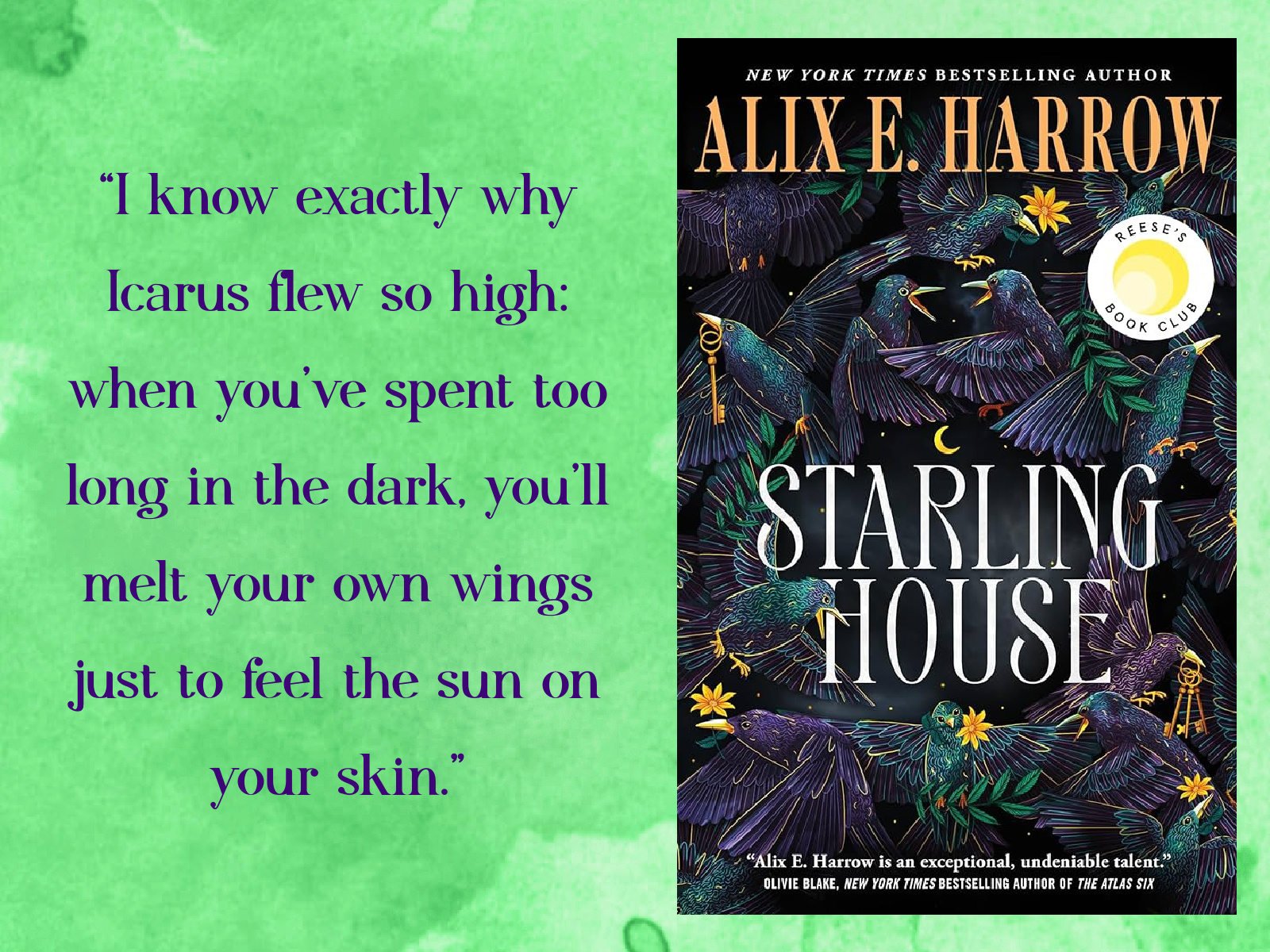
Woke Up Like This, by Amy Lea: Charlotte Wu, a driven and organization-obsessed seventeen-year-old, is eager to finish off her high school bucket list with a successfully planned and executed senior prom. Unfortunately, her archnemesis J.T. Renner is making that difficult. Renner has been foiling her plans since Freshman year, ever since he stood her up on what would have been her first high school dance. He ruined her chances at getting a driver’s license and stole the nomination for Senior Class President, and now he is ruining her best ideas for prom. But her high school angst comes to an abrupt halt when Charlotte and Renner wake up in an unfamiliar bed, thirty years old and apparently engaged to one another.
If there’s one thing Charlotte and Renner can agree on, it’s that they CANNOT get married to one another, and the two unite to find a way out of their thirty-year-old bodies and back to their high school selves. But in this transport to the future, Charlotte realizes that there may be more to Renner than the falsely charming antihero she thought she knew.
I don’t read much YA these days, but I’m a huge sucker for a time travel story and the 17-going-on-30 premise of this one drew me in. And it was a really fun read! I related to the ambitious and perfectionistic Charlotte, and though aspect son her teen narration annoyed me, I found her story pretty cute. I was surprised that a majority of the book is set in Charlotte’s teen years and wanted a more extended time hop, but I suppose this time framing makes sense given the intended audience.
This is not a book I would have read as a teen (it would have been pretty racy for me at the time), but for the most part it’s pretty PG which I appreciated. There are good messages here, too, about how relationships change with time (and how that is not a bad thing), and about giving others the benefit of the doubt. These are good reminders for teens AND the adults who are reading over their shoulders.
My Rating: 4 Stars // Book Format: Kindle
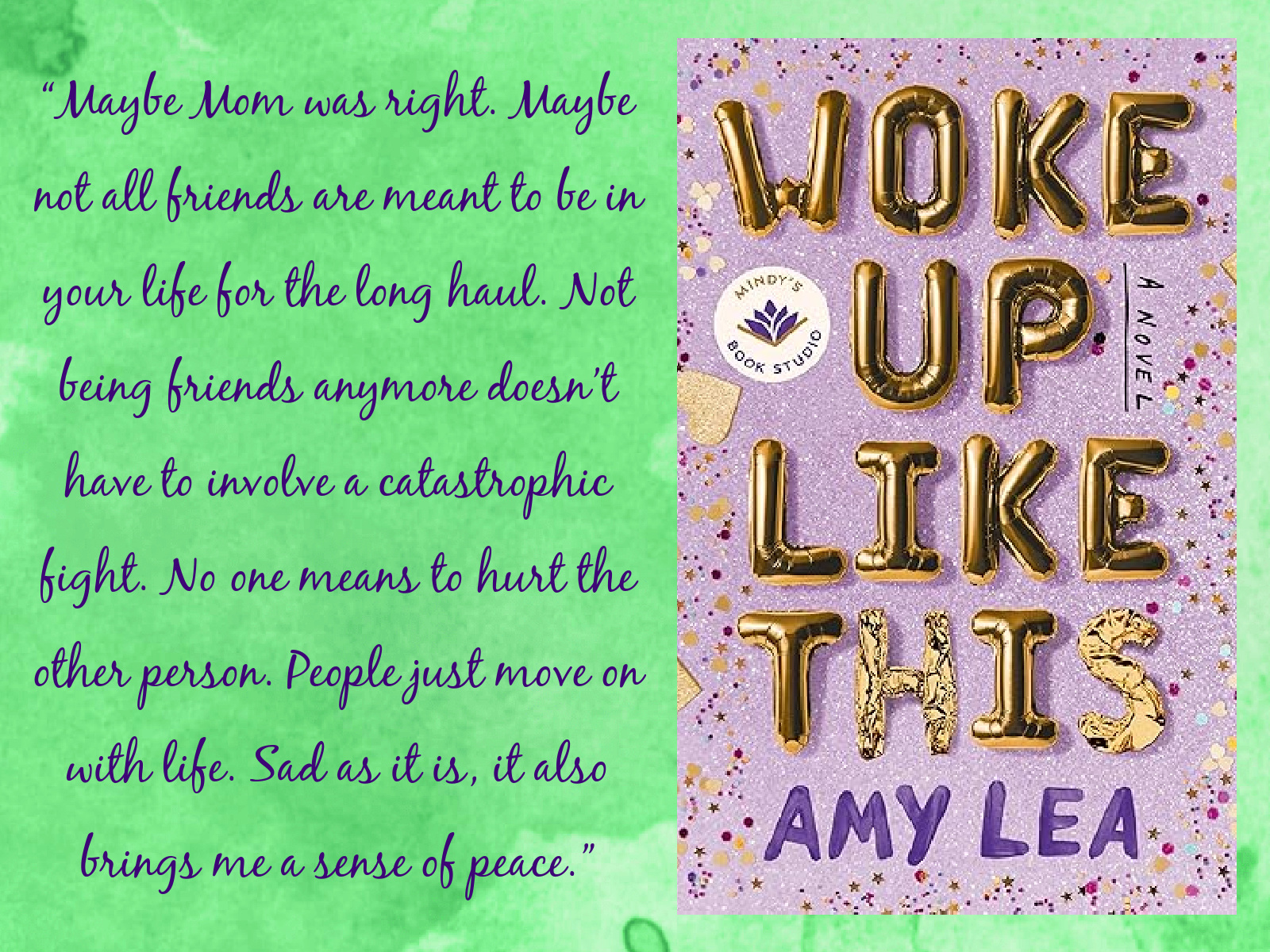
Parnassus on Wheels, by Christopher Morley: Helen McGill is a 39-year-old spinster who is bored with her life on a farm, baking bread and keeping house for her ungrateful brother, Andrew. But her life changes in an instant when a charismatic bookseller named Roger Mifflin arrives at her doorstep in Parnassus, his traveling book wagon, offering to sell the store so that he can settle down and begin writing books. Helen knows that Andrew will be quick to snatch up Parnassus, heading off on an adventure and once again leaving her at home, so she beats him to it and sets out on an adventure of her own. Soon she and “The Professor” are traipsing across the countryside, hand selling books to farmers and countryfolk and having the time of their lives. Their time on the road is peppered with harrowing roadside brawls, run-ins with the law, plenty of soul-searching and book discussions, and even a touch of romance.
This book is an absolute delight! I loved everything about it: the bookish themes, the spunky protagonists, the folksy tone, rollicking pace, and especially the insights into the role books can play in creating a meaningful life. For a book that was written more than a century ago, this feels shockingly current (minus some unkind descriptions of Helen’s body size that may bother some contemporary readers). I wish the ending had not been so abrupt, yet I found the novella length to be nearly perfect. This is a must-read for every booklover.
My Rating: 5 Stars // Book Format: Kindle
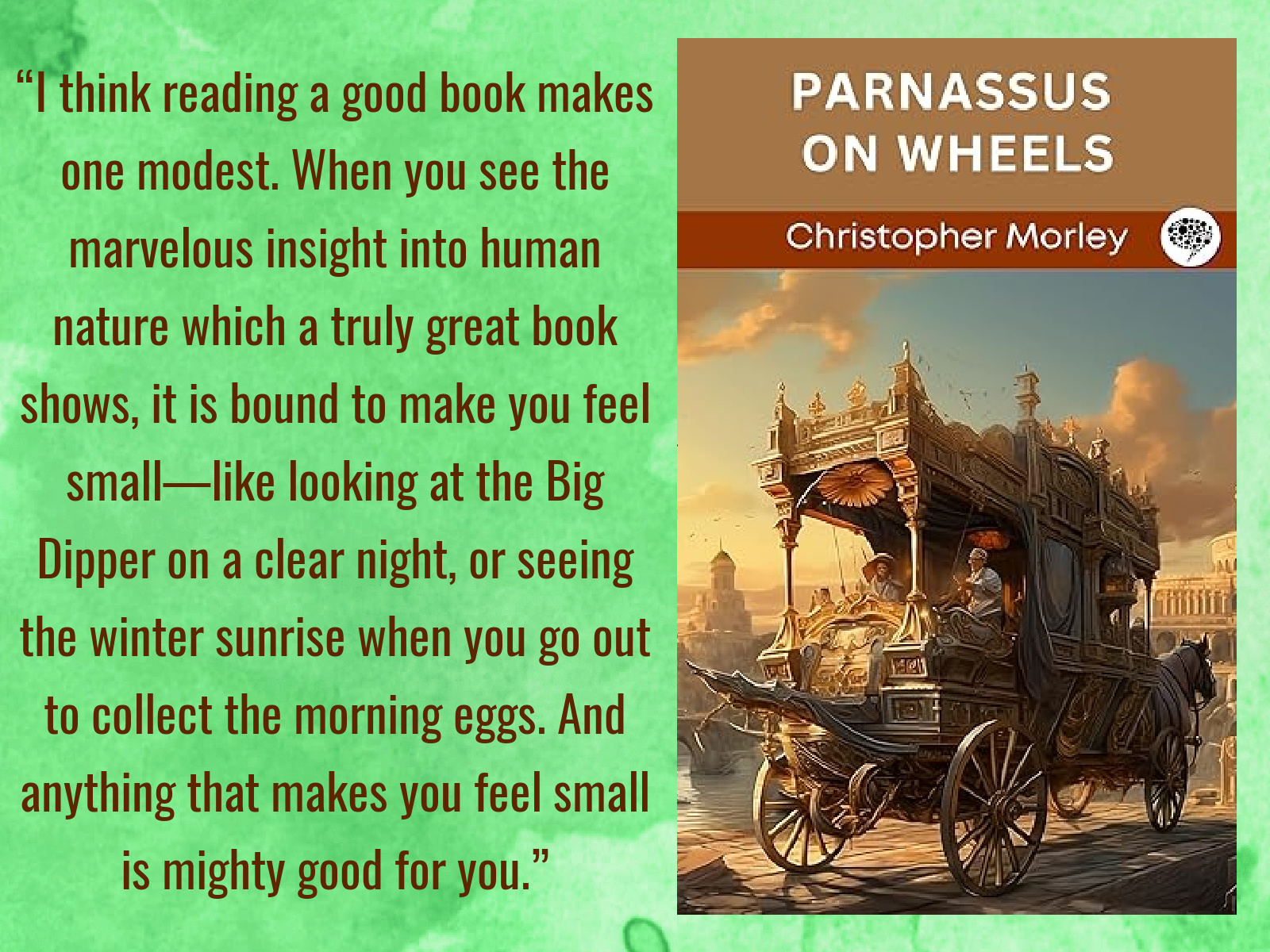
Vera Wong’s Unsolicited Advice for Murderers, by Jesse Q. Sutanto: No doubt about it, Vera Wong’s glory days are behind her. At sixty, she still keeps to a rigorous schedule: up by 4:00 AM for a brisk walk and back in time to to open her “World Famous” Tea Shop in San Francisco’s China Town. She still sends regular nagging encouraging texts to her adult son, Tilly (not that he ever responds). She still takes great care with the daily preparation of tea for her solitary patron (an elderly gentleman with whom she commiserates about grown sons who show little respect for their elders or their cultural heritage). But Vera’s life lacks the companionship and purpose that she felt when her husband was alive, her son was young, and her tea shop had frequent customers.
Then one morning, Vera emerges from her living quarters to find a dead body in the middle of her tea shop. Certain that the police will botch the investigation, Vera takes matters into her own hands and becomes intent on solving the murder of this strange man. And soon, even more excitement appears in her tea shop in the form of four young customers, each drawn back to the scene of the crime. Leaning into her Chinese mother instinct, Vera surmises that one of these individuals is surely the killer. What she doesn’t except is that these four suspects will quickly become her friends and newfound family, the little chicks this mother hen has been aching to feed and nurture. But as much as she cares for them, Vera knows these four new friends each have something to hide and she is set on discovering their secrets and their connection to this ever-confusing mystery.
I won’t bury the lead here: I LOVED THIS BOOK! It has all the components of a cozy mystery, but it’s so much more: it’s a sweet story of found family, a comedy, and an engaging (and humorous) commentary on Asian culture, specifically the nature of overbearing but well-meaning Asian mothers. (That last is a subject the author apparently knows well, as the book is dedicated to her Mama, “The OG Vera”). Vera is a complex yet believable and endearing protagonist, surrounded by a cast of equally lovable side characters.
I will say that it isn’t a perfect book: the plot is pretty farfetched (not that I minded) and there are some timeline issues that should have been cleaned up in editing. I was also put off by a two-yer-old who is written as much older (as I noted in my review of Starling House, unrealistic character ages are a major pet peeve of mine). But I had no problem overlooking thee issues for the sake of a funny and heartwarming story, filled with delicious food and salivating descriptions of Vera’s “world famous” teas.
This is great for fans of the Finlay Donovan and Tuesday Murder Club mysteries. I would love to see it made into a series.
My Rating: 5 Stars // Book Format: Print & Kindle
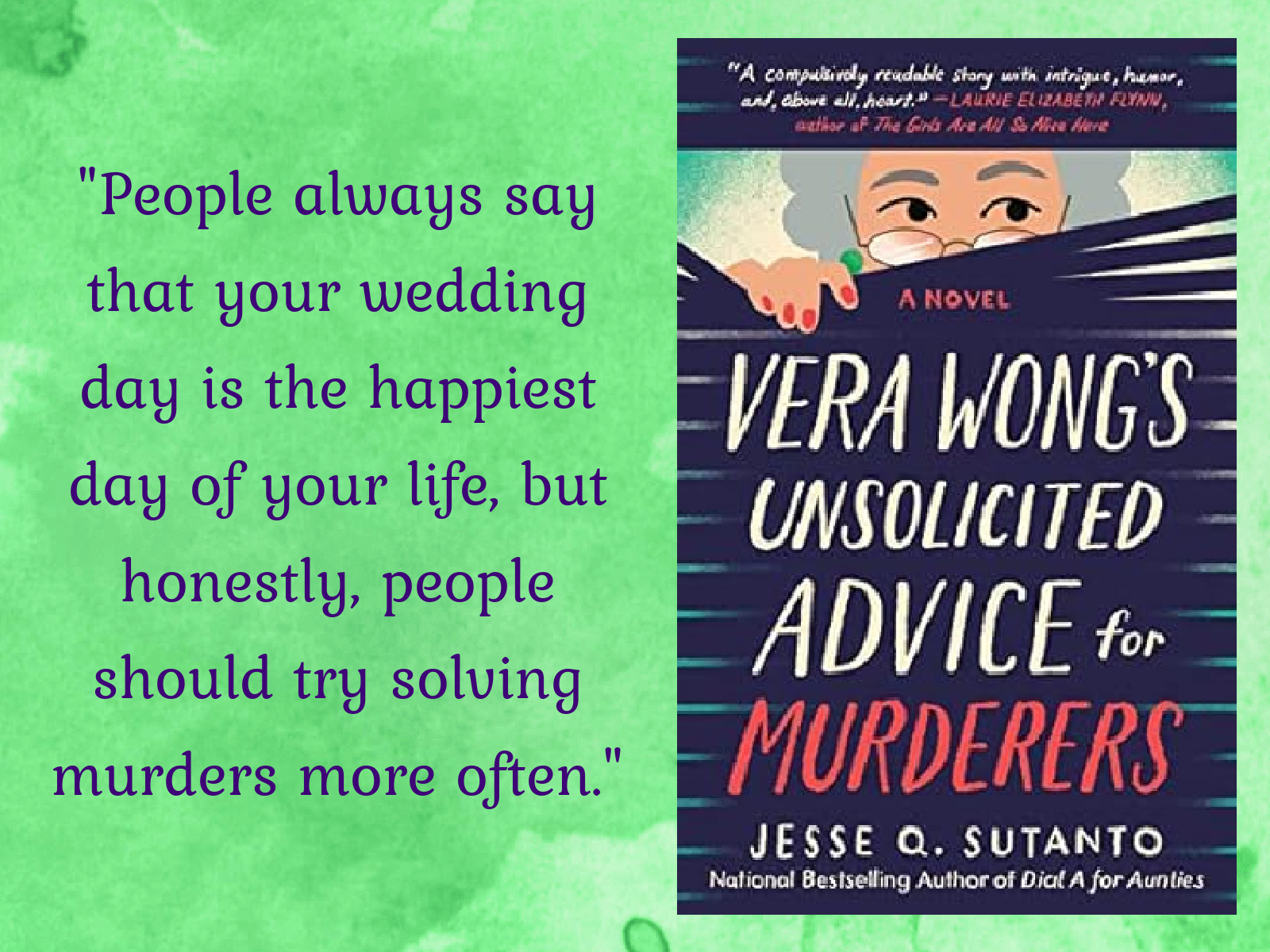
Have you read any of these titles? If so, I’d love to hear your thought! And also, please let me know what YOU have been reading and loving (or hating!) lately!
I’m listening to Vera Wong right now. It’s so much fun! I’ve had Parnassus on Wheels on my shelf for awhile. Need to bump that up my to-read list. I gave Woke Up Like This to our college daughter for Christmas. I’m thinking she will love it.
I’m glad you are loving Vera Wong! And I hope your daughter enjoys Woke Up Like This, it’s a lot of fun!
Thanks for the wide variety of reads and your thorough, thoughtful reviews, Kendra. I hope this weekend gives you time for more good books …
So many great books on this list. I really enjoyed A Door in the Wall and look forward to reading it to my son when he’s older, but I definitely agree it would probably land better when studying the midevil time period. Habits of the Household was SO good. I implemented a lot from that book in the past year and it has blessed us so much. Pernassus on Wheels was a delight!
Here are my recent reads, if interested https://elle-alice.blogspot.com/2024/02/january-and-february-book-reviews.html
I loved Trixie Belden as a kid! And I used to use THE DOOR IN THE WALL when I taught middle school social studies and English. It tied in nicely when we studied the Middle Ages.
We were probably a little overambitious trying to read it with my 4- and 9-year-olds. I think Middle School would be perfect!